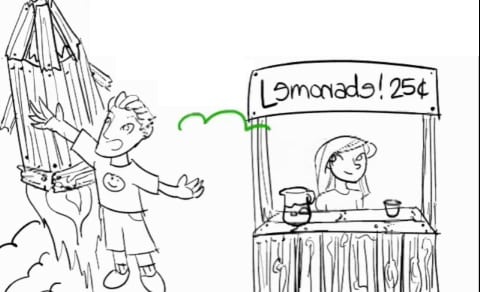Of the four dichotomies, the largest discrepancy lies in the difference between Sensors and Intuitives. Whereas there is an approximate 50/50 split in the population between the other preferences, a full 70% of the population prefers Sensing versus only 30% favoring Intuition.
When you distill it down, the difference between Sensors and Intuitives is this: Sensors prefer reliability of information, and Intuitives prefer speed and depth of insight. This ends up manifesting itself a couple of unique ways. First, Intuitives learn to trust pattern recognition to help them understand information quickly and see things that aren’t ‘there’. Basically, they extrapolate large amounts of information from only a few data points.
Sensors, of course, have this same ability. But they don’t trust it, and so they don’t hone it. Instead, they trust reliable information – things that can be verified in the Real World. Therefore, they become masters of historical information – their own history as well as other people’s. They also become fantastic at manipulating objects in real time. There is no need to question reality when it’s right there in front of you. Reality is reliable. Speculation isn’t.
Second, how they see information informs how both these preferences see time. If real, reliable, solid information is what you choose to focus upon, then the here-and-now context becomes far more important, as well as past information (which used to be the here-and-now context). Sensors can’t rely on what hasn’t happened yet, so the future becomes far less interesting. On the other hand, Intuitives are already comfortable seeing what ‘isn’t there’ – as in, they’re comfortable theorizing and speculating on what could be in both the here-and-now as well as into the future. The past doesn’t really hold their interest any more than a reference point for future predictions.
Third, these differences alter both values and basic interests. For Sensors, values surround things like family, tradition, getting into action, old friends, etc… these are all rooted in the known and knowable, and therefore can be trusted. For Intuitives, values focus more on the cerebral – possibilities, memes, paradigms, perspectives and concepts. Conversation will generally revolve around these things, with little interest in small talk.
Both Sensors and Intuitives have an important role. Sensors often “hold down the fort” – uphold infrastructures that keep us going as a society. Intuitives are generally the “trailblazers” – coming up with new ways of looking at and doing things which fashion new technologies and paradigms. It makes sense that fewer Intuitives would be needed – too much innovation and everything collapses. But without innovation, the world stagnates.
Understanding and appreciating these differences is how we cooperate to create both a stable system as well as pathways to whole new worlds.
When you’re ready, here are five ways we can help you grow…
1. Reclaim Authorship of Your Life (Free Audio): Become the Main Character Your Own Life
2. Regulate your Body, Emotions, Thoughts, & Intuition with Self-Regulation Mastery
3. Understand yourself at a deeper level with a Personality Owners Manual
4. Master the Art of “Deep Reading” people in Profiler Training
5. Rewire your Brain & Build a Life that Fits You in the Personality Life Path


Share:
What's the REAL difference between "Introverts" and "Extraverts?"
Are "Thinkers" Rational, and "Feelers" Irrational?
90 comments
It might look like England. ? I’ve been away for more than 20 years so it may have changed a little. However, I read an article a while ago that referenced research that suggested Britain had around 75% introverts, as the exact opposite of America’s 75% extroverts. It explained my sudden difficulty interacting with the general population here at first versus the little to no effort that was required back home.
Hello Thank You for your amazing work and for creating this wonderful site for sharing our uniqueness.
I’m an ENFJ and I love learning what makes us all different from each other. I now have a new and deeper understanding of myself. Feeling grateful.
Marlene
There is a need for iNtuitivity as for Sensing, such things wouldn’t exist otherwise. We need each other.
Also I don’t think there is a person 100% Intuition or 100% Sensing, there is always both of them in a person, and that is what makes people understandable. Some of the people can be situated in a middle point, 50%/50%, and that is possible for all traits not only N ans S.
This is just a system to categorize them, but I think the reality is much more complex.
The difference between us are not to make war between us but to help each other acordingly. If a person would be capable of doing all the things by himself then he wouldn’t need anyone else do to anything, and he would problably be alone. But because we are different and not “perfect”/have different traits we need each other to live and that makes us being more toghether than distant with each other. Also we can love the others for what they are and respect what makes them unique. We need to cherish that.
Have a nice, happy day!
Hi Lisa, You may resonate well with the ISFP because you have exactly the same cognitive functions, both introverted and extroverted, just in different order… Just a thought.
Feelers can get things done with their intuition too. It’s not just F/T it’s also P/J. Because if you plan how you’re going to use the facts you’ve gathered then you can put them to action.